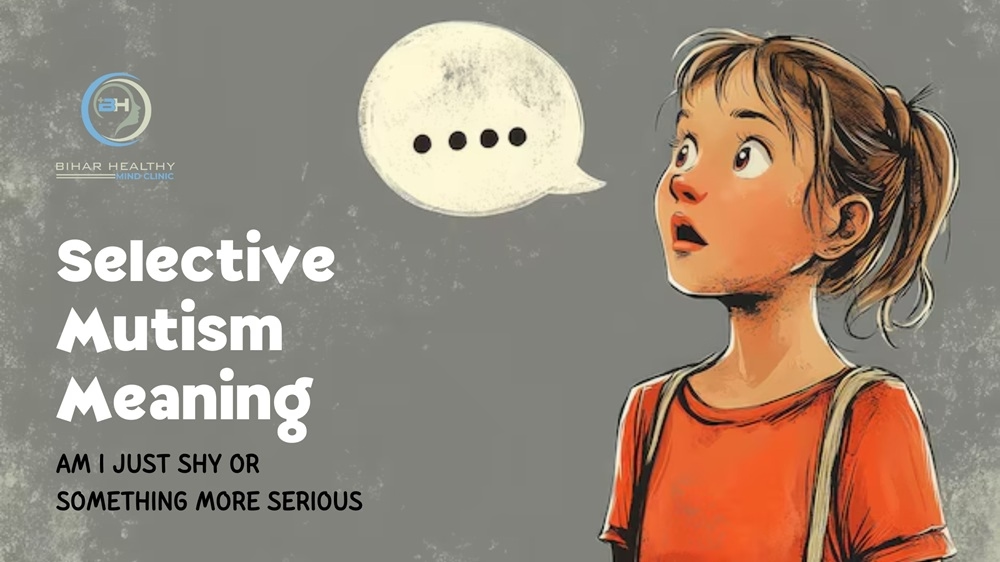
When someone struggles to speak in certain social situations despite being perfectly capable of speaking in others, the concern often arises - is this simple shyness, or is it selective mutism? Understanding the selective mutism meaning and its difference from normal shyness is essential in recognizing the right path for treatment. At Patna Psychiatry, under the guidance of Dr. Saurabh Kumar, MD (Psychiatry), individuals receive comprehensive evaluation and care to address such concerns.
What is Mutism in Psychiatry?
Before we dive deeper, it’s important to understand mutism definition in psychiatry. Mutism refers to the inability or refusal to speak despite having the physical and cognitive ability to do so. While mutism can occur in different psychiatric conditions, selective mutism disorder is a unique condition that usually begins in childhood.
Selective Mutism Meaning Explained
Selective mutism refers to an anxiety-related condition where a person is unable to speak in certain environments, such as school or workplace, despite being able to communicate freely in familiar surroundings like home. It is not a matter of being stubborn or disobedient; instead, it is a condition linked to social anxiety and fear of being judged.
For example, a child may chat freely with parents at home but remain completely silent in class. Similarly, selective mutism in adults can manifest as difficulty communicating in workplaces, interviews, or group conversations while being able to speak normally with close friends.
Selective Mutism Symptoms
Recognizing the selective mutism symptoms helps differentiate between shyness and a disorder.
-
Some common signs include:
- Persistent failure to talk in particular situations while remaining capable of speaking in different contexts.
- Depending on non-verbal cues such as gestures, head nods, or written notes rather than verbal communication.
- Exhibiting anxiety-related responses such as turning red, perspiring, or avoiding direct eye contact during social interactions.
- Severe distress when expected to talk in unfamiliar settings.
- Normal or even advanced language skills at home, but silence elsewhere.
While shy individuals may feel nervous initially, they usually warm up over time. In contrast, those with selective mutism disorder remain persistently unable to speak in specific settings.
Causes and Risk Factors
While the exact causes of selective mutism remain unclear, psychiatric studies suggest it arises from multiple contributing factors:
- Anxiety disorders: Strongly linked with social anxiety.
- Genetics: Family history of anxiety or mutism in psychiatry increases risk.
- Temperament: Children who are extremely cautious, sensitive, or withdrawn are more prone.
- Environmental factors: Challenging or unfamiliar social situations may activate the condition’s symptoms.
Selective Mutism in Adults
Although commonly identified in children, untreated selective mutism can continue into adult life. Selective mutism in adults can interfere with career growth, relationships, and confidence. Adults may avoid public speaking, interviews, or even simple conversations, which can be mistaken for rudeness or arrogance. In reality, it is an anxiety-driven condition requiring professional support.
Selective Mutism Treatment Options
Effective selective mutism treatment is available, and early intervention leads to better outcomes.
-
Common approaches include:
- Behavioral Therapy - Approaches such as gradual exposure, shaping, and stimulus fading are used to encourage speech in anxiety-provoking situations.
- Cognitive Behavioral Therapy (CBT) - Helps challenge and reframe negative thoughts associated with speaking.
- Family Therapy - Engages parents and caregivers to build a nurturing and supportive setting both at home and within educational environments.
- Speech and Language Therapy - Works alongside psychiatry to improve communication skills.
- Medication - In severe cases, psychiatric medications for anxiety may be recommended under supervision.
At Patna Psychiatry, Dr. Saurabh Kumar, MD (Psychiatry) carefully tailors treatment plans based on individual needs, ensuring compassionate and effective care.
Why Early Diagnosis Matters
Delaying treatment can result in worsening anxiety, poor academic or career performance, and difficulty in building social relationships. With timely intervention, individuals often show remarkable progress.
Selective Mutism vs. Shyness
The biggest challenge lies in distinguishing selective mutism from mere shyness.
If you or your child show persistent signs of silence in specific situations, seeking help from the best psychiatrist in Patna is a wise step toward clarity and healing.
Support at Patna Psychiatry
At Patna Psychiatry, every patient receives holistic care in a compassionate environment. The clinic focuses not only on diagnosis but also on long-term recovery through therapy, guidance, and medical support where needed. Selective mutism disorder may sound intimidating, but with the right psychiatric care, individuals can overcome their fears and learn to express themselves confidently.
Conclusion
Understanding selective mutism meaning goes beyond labeling someone as “just shy.” It is a psychiatric condition that requires empathy, awareness, and structured treatment. Whether in children or selective mutism in adults, recognizing the symptoms early and consulting the Best psychiatrist in Patna can make a life-changing difference. At Patna Psychiatry, under the expertise of Dr. Saurabh Kumar, individuals struggling with mutism in psychiatry find personalized treatment plans, supportive therapies, and renewed hope for recovery.
Disclaimer: All characters and events depicted in this blog are entirely fictional. Any resemblance to actual persons, living or dead, is purely coincidental. The content is intended for informational purposes only and should not be considered as medical advice. Always consult a qualified healthcare professional for medical concerns.
-
Here are a few points of difference:
- Duration: Shyness usually improves as a person gets more comfortable; selective mutism persists for months or even years.
- Consistency: A shy person may speak softly in new settings, whereas someone with selective mutism may not speak at all.
- Impact: Selective mutism disrupts learning, work, and relationships, unlike general shyness.
Visitors: 92





No comments yet.